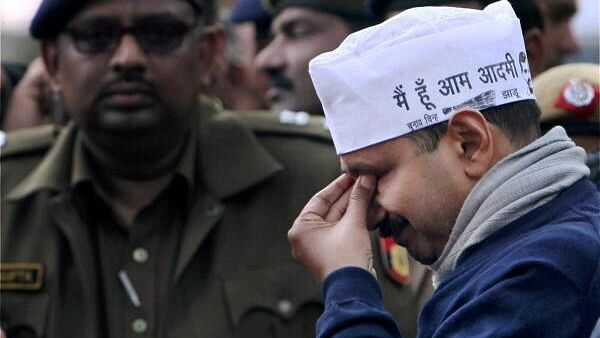
Delhi Chief Minister Arvind Kejriwal attends a dharna near Rail Bhavan in New Delhi.
Credit: PTI File Photo
As India braces for a seven-phased Lok Sabha election, threat looms over the Aam Aadmi Party (AAP).
Hours after the Delhi High Court rejected his plea seeking protection from any 'coercive action' by the agency, the Enforcement Directorate (ED) on Thursday night, arrested AAP convener and Delhi chief minister Arvind Kejriwal in a money laundering case linked to the now-scrapped Delhi excise policy.
With this, Kejriwal becomes India's first CM to get arrested while holding the office.
AAP staged nation-wide protests against the party chief's arrest on Friday asserting that Kejriwal will continue running the office despite being jailed.
But how will running a government from jail work and what is in store for Delhi's polity, Moreover, what's next for Kejriwal?
Let's take a look at the legalities of it and the possibility of President's rule being imposed in the national capital.
What does the law say about the arrest of a sitting CM?
Proving to be an exception to the Article 14 of the Indian Constitution (Right to Equality), Article 361 of the constitution states that the President or the Governor is not answerable to any court for the exercise of the powers and duties of his office and 'no criminal proceedings shall be conducted against the President or the Governor during his term of office'.
This immunity does not extend to Chief Ministers or Prime Ministers who are subject to the principle of equality before the law as the constitution advocates.
Is it possible for Arvind Kejriwal to run a government behind bars?
As per law, Kejriwal has the immunity to hold office until he is convicted of money laundering. If convicted, Kejriwal will be disqualified from the post.
Representation of the People Act, 1951, outlines provisions for disqualification and states that until conviction, there is no need for an elected representative to quit.
Is there a possibility of President's rule?
Article 239AA empowers Delhi Lieutenant Governor to invoke 'failure of constitutional machinery' enabling the imposition of President's rule under Article 239AB.
AAP's tenure in Delhi ends in February 2025 and this move would enable the Centre to take control of the national capital until that time, risking the support Kejriwal has managed to garner in Delhi.
If Kejriwal resigns, replicating what former Jharkhand CM, Hemant Soren did, it could save the party from government dissolution but there is no guarantee of that happening as the political dynamics of Delhi keep shifting by the second.
If not Kejriwal, who can lead AAP?
Since nearly all senior AAP leaders - Manish Sisodia, Sanjay Singh, Satyendar Jain - are currently behind bars, the next biggest name is that of Punjab CM Bhagwant Mann.
In Delhi, the party has Gopal Rai, Atishi and Saurabh Bharadwaj.
As of now, Atishi and Bharadwaj have been detained by the police over protest against Kejriwal's arrest.
ED on Friday produced Kejriwal in the Rouse Avenue court seeking 10-day custody in the money laundering case and eventually, he was sent to custody for six-days. On his way to the hearing, he told TV9 Network, "My life is dedicated to the service of the nation whether I am inside or outside (jail)."
Kejriwal was one of the key personalities in Anna Hazare's 'India Against Corruption' movement and his arrest in a money laundering case appears to be an oxymoron.
As the national politics keeps unfolding with the disclosure of 'controversial' electoral bonds and constant ED raids on opposition leaders, one has to see what situation the national capital is presented with because that can swiftly change the ever-changing cataclysmic politics of India, that is a 'Union of States'.